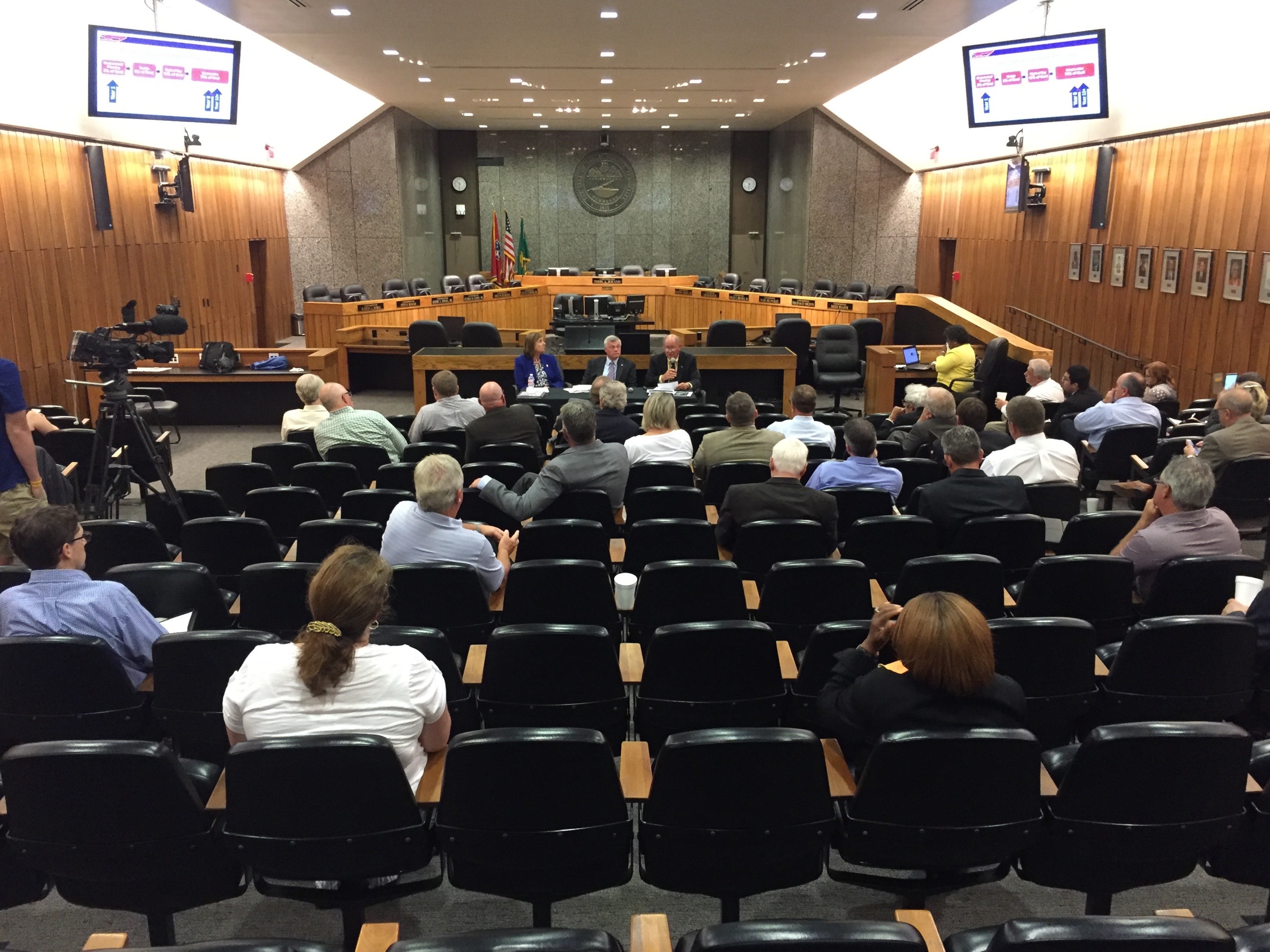 Toby Sells
Toby Sells
Senator Jim Tracy (front, center) brought his listening tour to Memphis Tuesday.
Tennessee road revenues have stagnated. Highway construction costs have risen. Tennessee has a backlog of $6 billion in road project, more than $800 million worth of them around Memphis. Something must be done.
That’s the word from the Memphis stop of state Senator Jim Tracy’s nine-city listening tour on Tuesday.
Tracy (R-Shelbyville) is the chairman of the Senate’s Transportation and Safety Committee and is using the tour to, of course, listen to local officials but to also discuss the challenges in funding the state’s long-term needs for its transportation system.
Tracy’s tour came Tuesday as Tennessee Governor Bill Haslam repeated his call for action on the state’s road construction backlog to reporters in Murfreesboro Monday. Haslam told reporters he has yet to set forth any specific recommendation to fix the backlog.
He said a gas tax hike likely won’t happen this year but said in March that a tax hike must happen in the next four years. Tracy has said he will not support a gas tax hike in the next legislative session.
Tracy brought with him Susan Mattson, a research analysts with the Tennessee Comptroller’s Office, and Bill Moore, chairman of the Tennessee Infrastructure Alliance and former chief engineer of the Tennessee Department of Transportation.
Mattson said, basically, that state transportation revenues are not expected to be sufficient for new projects or the long-term maintenance of highways. Most of the state’s road revenues, she said, come from a fuel tax, a fixed-rate fee assessed on gallons of fuel.
The last gas tax increase, she said, was in 1989. The last diesel fuel tax increase was in 1990.
Since then, automobile fuel efficiency has greatly improved, she said. So, even though people may be driving the same amount of miles each year, they’re paying less in fuel taxes to pay for the roads. The state is working on tax programs for electric cars and those running on compressed natural gas, like trucks run by FedEx and UPS, Tracy said.
But people are also driving less in general, Mattson said, pointing to the example that millennials are streaming into urban centers and opting for public transportation.
All of this, she said, has driven Tennessee road revenues down.
That’s bad news, according to Moore, who said some Tennessee roads might not get the fixes they need. He said there were around $800 million worth of projects around Shelby County that are sitting on the shelf because of a lack of funds.
Here are a few he mentioned:
1. Lamar Avenue – from Getwell Road to Mississippi state border
Plan: widen the road
Cost: $229 million
2. I-240 – from I-40 Midtown to I-55 South
Plan: re-build all interchanges on the six-mile stretch, improve conditions for future I-69 corridor
Cost: $50 million
3. SR 14 – from Covington Pike to Tipton County line
Plan: improve the 12.5-mile section
Cost: $75 million
4. I-40 – from Germantown Road to Collierville/Arlington Road
Plan: widen 8.4 mile stretch of road from four lanes to eight lanes
Cost: $65 million.
Most of the projects, Moore said, are shovel-ready and only await TDOT funds to get started.
Mattson put forth some options for new revenues.
A one-cent higher gas tax, she said, would yield about $31 million in new road revenues. A one-cent hike on the diesel tax would yield $9.6 million. An average Tennessee citizen, she said, pays about $160 per year in gas taxes, for a total of $300 of total taxes.
Matron said other states tax miles driven instead of fuel. This, she said, usually requires the state to install some sort of GPS tracker on cars.
Another options, she said, would be for the state to issue debt on road projects, something Tennessee has never done.
Yet another option is to levy tolls at booths on drivers for their use of highways.